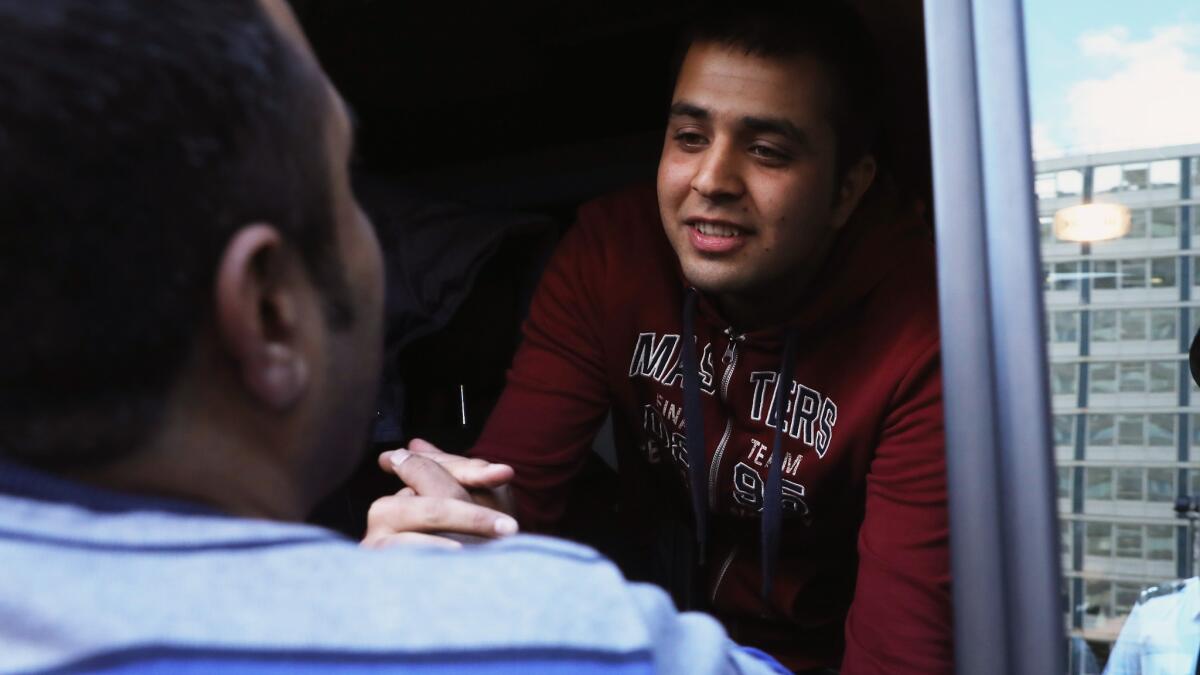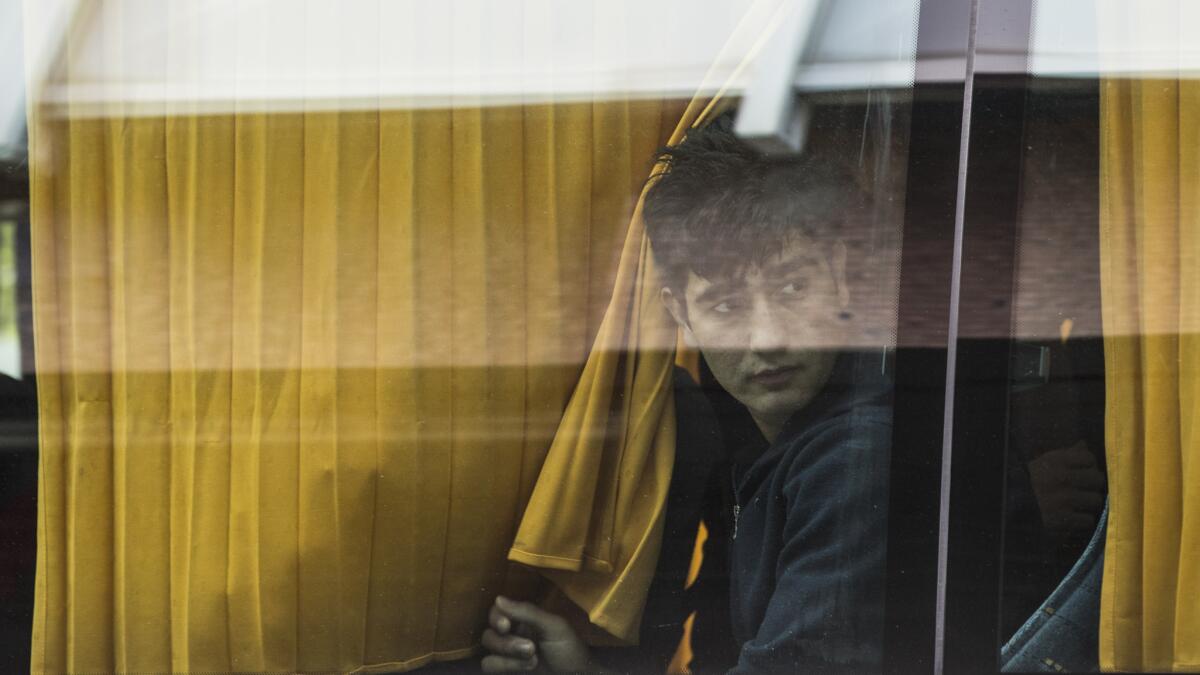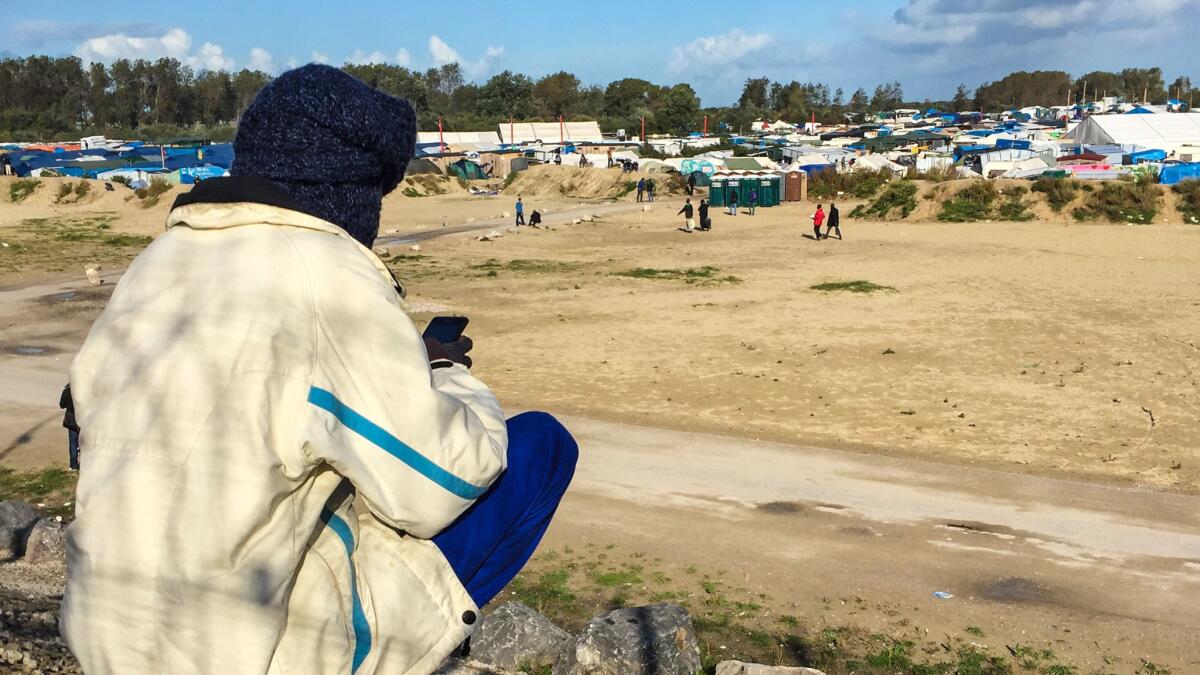A journey through ‘hell’: First wave of migrant children from Calais arrives in Britain

- Share via
Reporting from London — A group of 14 children who have been living in a squalid refugee camp in France was brought to Britain on Monday, the first in a likely wave of minors expected to arrive here before French authorities demolish an encampment that became known as “the Jungle.”
Campaigners have lobbied the government to accommodate young refugees who have a legal right to resettle in Britain. Until now, though, the majority of their cases have been marred by lengthy bureaucratic delays.
Against that backdrop, the arrival Monday was hailed as a victory by aid groups that had warned that the young migrants were at risk of being trafficked, or simply going missing if swift action wasn’t taken.
“I think we’ve got the beginnings of some sort of response to what is still a hugely troubling and very, very urgent situation,” said Rowan Williams, the former archbishop of Canterbury who has been helping with efforts to bring the children to Britain.
“We can offer secure environments for these children. We can offer a place of safety, a place of security for deeply traumatized and deeply needy people and I think that’s just a basic moral imperative for us to step up to.”

The Home Office, which oversees immigration in England, said those who arrived Monday were 14- to 17-years-old. They are believed to all be boys from war-torn countries including Afghanistan and Syria who wound up in the Calais camp without a parent or caregiver.
The teenagers left France in a minibus Monday morning and were first brought to an immigration center in Croydon, south of London, where they had to register with the UK government.
One 14-year-old boy from Afghanistan was greeted by an older brother who had fled to Britain 11 years ago and now works as a chef.
Asif Khan, 25, said his younger sibling’s journey had been “hell” and had involved walking and traveling by bus to Calais where he had been unable to go any farther.
“It was a blessing to receive him from there,” Khan told the Press Assn. “I’m really happy.”
There are an estimated 10,000 people living in the Calais camp, which is close to the ferry terminal and Channel Tunnel that links France and Britain. The inhabitants come from a variety of countries including Afghanistan, Sudan, Eritrea, Ethiopia, Iraq and Syria, according to aid groups.

Many of those living in the camp say they their goal is to reach Britain. The exodus, though, has caused problems for border authorities with migrants often risking their lives trying to sneak onto buses.
French officials have made repeated attempts to close the camp and move those living there into more organized reception centers elsewhere in the country. But an attempt to raze the camp in March was only partially successful. It also resulted in the disappearance of 129 children.
“We don’t know if they were trafficked, some might have run away or made it to the UK. It’s hard to know. But those were kids who were being, in some sort of way, looked after by the voluntary sector and now we have no idea where they are,” said Olivia Field, advocacy officer at the British Red Cross.
During a visit to “the Jungle” in September, French President Francois Hollande said the camp would be demolished “definitively, entirely and rapidly” by the end of the year, raising fears that children would again go missing.
It is estimated that there are about 1,000 unaccompanied minors living in the Calais camp, and a recent count found that 178 of them have family in Britain, the British Red Cross said.
Under a law called the Dublin Regulation, children with close relatives in Britain can seek asylum there, even if they have sought asylum elsewhere.
But in the majority of instances, the cases dragged on for so long that some of the young people attempted the risky journey to Britain alone.
In September, a 14-year-old Afghan boy was killed as he tried to climb onto the roof of a truck heading to the port terminal. Authorities said he had a brother in Britain, and therefore a legal right to join him, but became too frustrated to wait.
In May, Lord Alf Dubs led an effort to get the British government to agree to take in some unaccompanied child refugees, even if they did not have relatives in the country.
However, no children have yet been admitted into Britain under this so-called Dubs Amendment to the Immigration Act, something he hoped the government would soon remedy.
“No child must be left behind in the chaos of demolition,” said Dubs, who came to Britain from Czechoslovakia in 1939 on one of the Kindertransport trains that saved Jewish children from Nazi Germany.
“Looking ahead we must never allow a repeat of Calais.”
More to Read
Sign up for Essential California
The most important California stories and recommendations in your inbox every morning.
You may occasionally receive promotional content from the Los Angeles Times.










